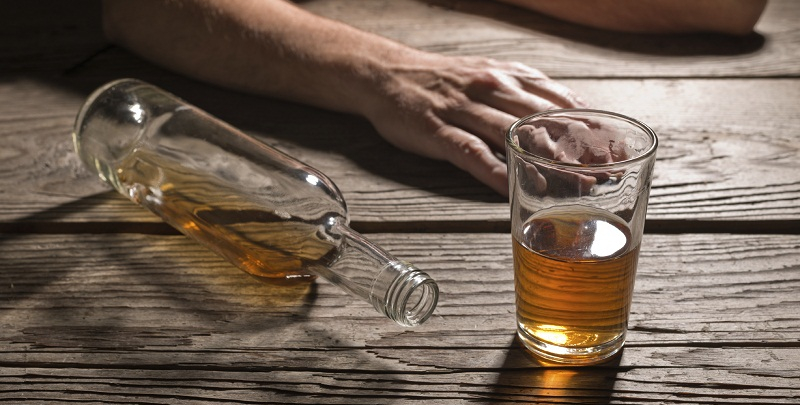Lifestyle-Health
Why is Binge Drinking Bad for You?

Alcohol is often associated with celebrations. But too much alcohol can cause both short-term and long-term harmful effects and can cause death. This article shows you the other side of alcohol – something that doesn’t call for a celebration
Drink to celebrate – in moderation
There is are many reasons to drink: parties, festive celebrations or watching a soccer game with your pals.
But when one drinks excessively, it is hardly a case for celebration.
Binge drinking refers to excessive consumption of alcohol over a short period of time. For a male adult, this is about five or more standard drinks, and for female, four or more standard drinks, in one drinking session. Binge drinking can bring with it both short-term and long-term harmful effects [1].
If you do drink, moderation is the key. Women should drink no more than one standard drink a day and men should limit themselves to two standard drinks a day. A standard alcoholic drink contains 10 grams of alcohol and this can be estimated to be:
1 can (330ml) of regular beer
Half glass* (100ml) of wine
1 nip (30ml) of spirit
*glass height = 15cm
Women have a different fat to muscle ratio and a smaller blood volume as compared to men.
With the poor solubility of alcohol in fats, the blood and tissue concentrations of alcohol become higher in women, even when the amount of alcohol consumed is adjusted for the body size.
Women may also have lower levels of alcohol dehydrogenase in the stomach than men, and as a result, less alcohol is broken down before absorption.
Alcohol dependence
A person who drinks frequently, or drinks a lot may become addicted to alcohol. Some signs of alcohol dependency include a strong urge to drink; the ability to drink larger quantities of alcohol without appearing intoxicated; persistent drinking; and undergoing withdrawal symptoms when trying to stop drinking [2].
Studies have shown that the younger the age a person started to drink, the greater their likelihood of developing alcohol dependance [3].
Short-term harmful effects: Alcohol poisoning
Alcohol poisoning is the most life-threatening consequence of binge drinking. When a person drinks too much, his or her body reflexes are affected. These include breathing and the pharyngeal reflex. The pharyngeal reflex, also known as gag reflex, helps to prevent choking. If this reflex is not functioning well, one may die from choking on his or her vomit.
Some other signs of alcohol poisoning include:
Lack of muscular coordination
Blurred or double vision
Drop in body temperature
Low blood sugar concentration
Low blood pressure
Impaired judgement
Coma
If a person shows signs of alcohol poisoning, lay him on his side and call for immediate medical attention. Alcohol poisoning can be deadly [4].
Long-term harmful effects
Drinking alcohol excessively and frequently for a long period of time can cause harm to several parts of the body.
Brain damage
Adverse effects on memory function, concentration, reasoning, planning and visuo-spatial skills.
Growth of the brain structure is affected.
Abnormalities in some areas in the brain
Stroke
Diseases in digestive system
Peptic ulcer, an ulcer usually found in the small intestine
Gastritis
Stomach cancer
Heart problem
Heart muscle disorders
Heartbeat rhythm irregularities
High blood pressure
Kidney damage
Kidney’s function in maintaining body fluids, leading to kidney enlargement
Liver disease
Liver function is affected
Development of fatty liver, which can lead to liver cirrhosis (scarring)
Alcoholic hepatitis (signs include swollen liver, nausea, vomiting and abdominal pain, bleeding, jaundice)
Psychological problems
Mental health problems such as depression, anxiety and insomnia
Sexual and hormonal dysfunction
Erectile dysfunction
Lowering of testosterone concentrations
Sperm growth is affected
Lowered fertility in women
Altered hormonal levels in premenopausal women, which increases the risk of osteoporosis
Breast Cancer
Latest available data indicate that half of all alcohol-attributable cancers in the WHO European Region are caused by “light” and “moderate” alcohol consumption – less than 1.5 litres of wine or less than 3.5 litres of beer or less than 450 millilitres of spirits per week. This drinking pattern is responsible for the majority of alcohol-attributable breast cancers in women, with the highest burden observed in countries of the European Union (EU).[5]
Skeletal muscle damage
Skeletal muscle myopathy (reduction of muscle weight and lean tissue wasting)
Other alcohol-related problems
Accidents, injuries and high-risk behaviours: Drink driving accounts for a large proportion of those injured or killed in road traffic accidents. Also, alcohol abuse is associated with high-risk behaviours such as physical assaults and risky sexual behaviour.
Pregnancy and/or child developmental problems: Prenatal exposure to high levels of alcohol has been associated with a range of developmental problems such as foetal alcohol syndrome, causing permanent birth defects.
Lower participation and involvement in daily activities: Binge drinking and subsequent hangovers contribute to the loss of productivity and/or absenteeism.
Celebrations can still be fun without alcohol. But if you drink to celebrate, know your limits and stick to them to avoid regrets.
-

 Lifestyle-Health7 months ago
Lifestyle-Health7 months agoInvesting ₹10,000 a month via SIP in this mutual fund would have swelled to ₹1.71 crore in 21 years. Check how
-

 Lifestyle-Health7 months ago
Lifestyle-Health7 months agoMultibagger small-cap stock under ₹50 jumps despite sell-off in Indian stock market
-

 News In Diaspora7 months ago
News In Diaspora7 months agoHotels and homes on Crete evacuated as wildfire burns out of control
-

 Breaking News4 months ago
Breaking News4 months agoIsrael Names 77 Countries That Boycotted Netanyahu’s UN Speech In Protest Over Gaza War
-

 Lifestyle-Health8 months ago
Lifestyle-Health8 months agoOgie Alcasid’s daughter Leila ties the knot in Australia
-

 Lifestyle-Health8 months ago
Lifestyle-Health8 months agoDriving Abroad: These 34 countries accept SA licenses
-

 Politics9 months ago
Politics9 months agoFinally Federal Government of Nigeria Assures Citizens, Says The President Isn’t Controlled by Any Cabal
-

 Lifestyle-Health5 months ago
Lifestyle-Health5 months ago11 signs of growth that you might have missed
-

 Lifestyle-Health8 months ago
Lifestyle-Health8 months ago10 Unwritten Rules for Visiting Bali that Travelers Should Know
-

 Breaking News5 months ago
Breaking News5 months agoVeteran actress, Peju Ogunmola, loses only child, Ayomikun
-

 Lifestyle-Health6 months ago
Lifestyle-Health6 months agoWhen to take time off and focus on yourself and your family
-

 Breaking News8 months ago
Breaking News8 months agoNeymar’s Net Worth in 2025: Football Career, Earnings, Endorsements, and More

